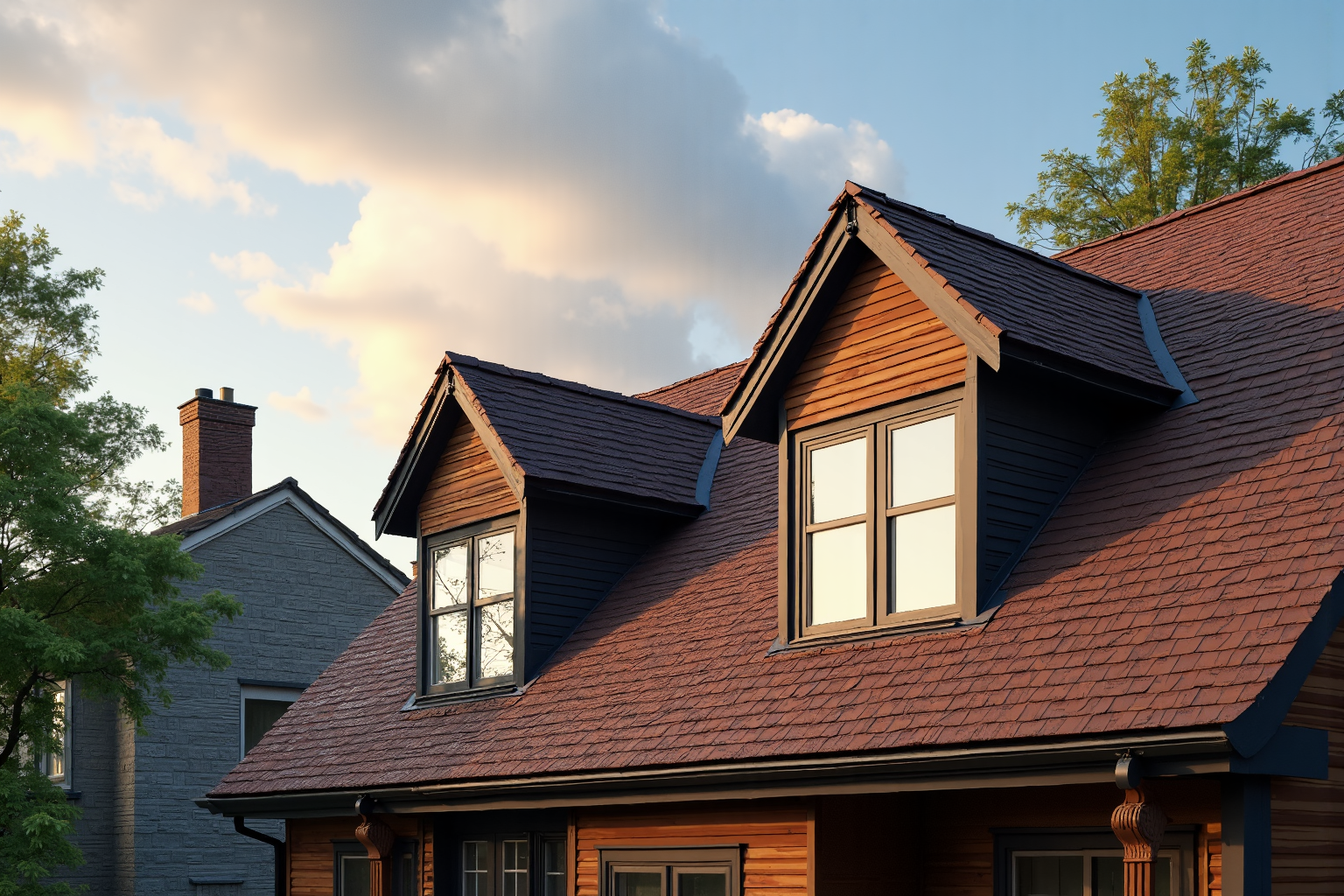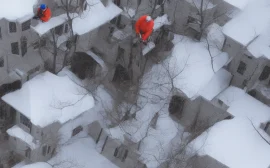Protecting Your Chicago Home: A Guide to Fireproof Roofing
Protecting your Chicago home from the ever-present threat of fire requires a multi-pronged approach, and your roof plays a crucial role in that defense. The Windy City, with its dense neighborhoods, historic architecture, and infamous winds, presents unique fire safety challenges. From the Great Chicago Fire of 1871 to more recent incidents, history underscores the importance of fire-resistant construction, especially in roofing. Your roof acts as the first line of defense against external threats, including airborne embers and radiant heat, making fireproof roofing a critical investment for every Chicago homeowner.
This guide delves into the essential aspects of fireproof roofing in Chicago, empowering you to make informed decisions to safeguard your property and loved ones. Chicago’s rich architectural tapestry, featuring everything from vintage bungalows to modern high-rises, necessitates a nuanced understanding of fire safety. The close proximity of buildings in many neighborhoods increases the risk of fire spread, making robust roofing materials essential. Think of the iconic brownstones and greystones lining Chicago’s streets; their shared walls and densely packed layouts highlight the need for preventative measures like fire-resistant roofing.
According to the Chicago Fire Department, roofing materials play a significant role in containing fires and preventing their spread to adjacent structures. Choosing a fireproof roof not only protects your individual property but contributes to the overall fire safety of the community. Furthermore, Chicago’s weather patterns, including strong winds and occasional extreme heat, exacerbate fire risks. Wind-driven embers can travel considerable distances, igniting vulnerable roofs and spreading fire rapidly. The combination of dry conditions and high winds can turn a small spark into a major conflagration, making the choice of roofing material a critical factor in fire prevention.
Experts from the National Roofing Contractors Association (NRCA) recommend Class A fire-rated roofing materials for optimal protection in wind-prone areas like Chicago. These materials have undergone rigorous testing to ensure they can withstand severe fire exposure, offering homeowners the highest level of protection. Beyond the immediate safety benefits, investing in a fire-resistant roof can also have long-term financial advantages. Many insurance companies offer discounted premiums for homes with Class A fire ratings, recognizing the reduced risk.
This can translate to significant savings over time, offsetting the initial investment in higher-quality roofing materials. Additionally, a fireproof roof adds value to your property, making it a more attractive prospect for potential buyers. In the competitive Chicago real estate market, a fire-resistant roof can be a significant selling point, providing peace of mind and potentially increasing resale value. This guide will explore the various aspects of fireproof roofing in Chicago, from understanding fire ratings and comparing different materials to navigating local building codes and ensuring proper installation and maintenance. By understanding these key elements, you can make an informed decision that protects your investment, enhances your property’s value, and most importantly, safeguards your family from the devastating consequences of fire.
Decoding Fire Ratings: Class A, B, and C
Understanding fire ratings is crucial when selecting roofing materials for your Chicago home. These ratings, classified as Class A, B, and C, reflect a material’s resistance to fire, with Class A offering the highest level of protection. Given Chicago’s dense urban landscape and architectural history, including the devastating impact of the Great Chicago Fire, the city’s building codes typically mandate Class A roofing for most residential properties. This prioritization of fire safety aims to minimize the risk of rapid fire spread and protect both lives and property.
This section will explore the nuances of each class and explain why Class A is considered the gold standard in Chicago, especially for homeowners seeking robust fire protection and compliance with local regulations. The Class A rating signifies the highest resistance to fire, tested under rigorous conditions involving severe exposure to external fire sources and intense heat. Materials earning this rating demonstrate exceptional ability to limit flame spread and prevent the penetration of burning embers.
This superior performance makes Class A roofing essential in densely populated areas like Chicago, where fire can quickly spread between buildings. Think of the close proximity of homes in neighborhoods like Lincoln Park or Wicker Park; a Class A roof can be the critical difference in preventing a localized fire from becoming a widespread disaster. For homeowners investing in a new roof, opting for Class A materials provides invaluable peace of mind. Class B roofing materials offer a moderate level of fire resistance, suitable for areas with a lower risk of external fire exposure.
While they may be less expensive than Class A options, they offer less protection against severe fire events. Class B roofs are tested to withstand moderate exposure to fire and limit flame spread to a certain degree, but they are not as effective at preventing ember penetration as Class A materials. In Chicago’s climate, where wind-driven embers can travel considerable distances, the enhanced protection of Class A roofing is generally preferred. Class C roofing materials provide the lowest level of fire resistance and are typically permitted only in specific situations where the fire risk is minimal.
These materials are tested to resist light fire exposure but offer limited protection against flame spread or ember penetration. Given Chicago’s stringent building codes and the emphasis on fire safety, Class C roofing is rarely used in residential construction within the city limits. Homeowners focused on long-term value and comprehensive protection should prioritize Class A or, in some cases, Class B roofing materials. Choosing the right fire rating is not just about meeting building codes; it’s about protecting your investment and ensuring the safety of your family.
A fire-resistant roof can significantly reduce the risk of catastrophic damage and potentially even save lives. Moreover, opting for a higher fire rating can often lead to lower homeowner’s insurance premiums, as insurance companies recognize the reduced risk associated with Class A roofing. When considering the cost comparison between different roofing materials, it’s essential to factor in the long-term benefits of enhanced fire protection and potential insurance savings. Consulting with a qualified roofing contractor in Chicago can provide valuable insights into the best options for your specific needs and budget, ensuring your home is equipped with the most appropriate level of fire defense.
Comparing Fire-Resistant Roofing Materials in Chicago
Chicago homeowners seeking to enhance fire safety and property value must carefully consider their roofing choices. From traditional asphalt shingles to modern metal roofing, a variety of fire-resistant materials cater to different budgets and aesthetic preferences. Understanding the fire ratings, lifespan, and maintenance requirements of each material is crucial for making an informed decision. This section compares popular fire-resistant roofing options available in Chicago, highlighting their pros, cons, and cost considerations, empowering homeowners to make the best choice for their property.
Asphalt shingles, a ubiquitous choice in Chicago, offer affordability and ease of installation. However, standard asphalt shingles provide only minimal fire protection. Opting for Class A fire-rated asphalt shingles, which are treated with special fire-retardant coatings, significantly enhances fire safety. These specialized shingles offer a balance between cost-effectiveness and fire protection, making them a popular choice for homeowners seeking a budget-friendly fire-resistant option. It’s important to note that the lifespan of asphalt shingles, even fire-resistant ones, is typically shorter than other materials, ranging between 15-30 years, depending on the quality and local weather conditions.
Regular maintenance and inspections are crucial to ensure their continued effectiveness. Metal roofing, including standing seam and metal tiles, offers superior fire protection and longevity. As a non-combustible material, metal roofing achieves the highest Class A fire rating, providing exceptional defense against fire spread. Metal roofs are also highly durable, withstanding Chicago’s harsh winters and strong winds, and boasting a lifespan of 50 years or more. While the initial investment for metal roofing is higher than asphalt shingles, the long-term cost benefits due to its extended lifespan and minimal maintenance make it a compelling choice.
Furthermore, metal roofs are energy-efficient, reflecting sunlight and reducing cooling costs during Chicago’s hot summers. This eco-friendly aspect adds to their appeal for environmentally conscious homeowners. Tile, slate, and concrete roofing options provide excellent fire resistance and contribute to a distinct architectural style. These materials are naturally fire-resistant and offer exceptional durability, often lasting for generations. While tile, slate, and concrete offer superior protection and longevity, they are also the most expensive options. The weight of these materials may require additional structural support, adding to the overall project cost.
However, for homeowners seeking a premium, long-lasting, and aesthetically unique roofing solution, these materials offer unparalleled value. Chicago’s historical architecture often features these materials, showcasing their timeless appeal and resilience. Choosing the right roofing material requires careful consideration of fire safety, budget, aesthetic preferences, and the specific needs of your Chicago home. Consulting with a qualified roofing professional is essential to assess your property, discuss your priorities, and determine the most suitable fire-resistant roofing solution that aligns with Chicago’s building codes and your long-term goals.
Investing in a fire-resistant roof provides peace of mind, protects your property, and can even lead to lower homeowner’s insurance premiums, making it a wise investment for any Chicago homeowner. Finally, understanding Chicago’s specific building codes and obtaining the necessary permits are crucial steps in any roofing project. Ensuring your chosen material and installation methods comply with local regulations is essential for both safety and legality. Working with a reputable roofing contractor who is well-versed in Chicago’s building codes streamlines the permitting process and guarantees a compliant and safe installation.
Chicago Building Codes and Permits for Roofing
Navigating Chicago’s building codes and permit requirements is essential for any roofing project, especially when it comes to fire safety. Overlooking these regulations can lead to project delays, fines, and even compromise the safety of your home. This section outlines the necessary permits and inspections required for roof replacements in Chicago, ensuring your project complies with local regulations. We’ll also discuss specific requirements for fireproof roofing materials and installation practices mandated by the city, empowering you to make informed decisions that protect your investment and loved ones.
Before commencing any roofing work in Chicago, you must obtain the appropriate permits from the city’s Department of Buildings. This typically involves submitting a detailed project plan, including the type of roofing material, installation methods, and proposed timeline. For example, replacing an existing asphalt shingle roof with a Class A fire-rated metal roof will require specific documentation demonstrating compliance with Chicago’s fire codes. Inspections are scheduled throughout the project to verify adherence to approved plans and local building codes.
These inspections ensure the quality of workmanship and the fire safety of the installed roof. Chicago’s building codes mandate the use of Class A fire-rated roofing materials for most residential properties due to the city’s dense population and historical vulnerability to fire. This stringent requirement underscores the city’s commitment to fire prevention and public safety. Choosing a Class A roofing material, such as fire-resistant asphalt shingles or metal roofing, is not just a matter of code compliance; it’s a crucial step in safeguarding your home and family.
While some roofing materials may offer initial cost savings, they may not meet Chicago’s fire safety standards and could jeopardize your insurance coverage. Investing in a Class A fire-rated roof provides long-term value, increased fire protection, and potential insurance premium discounts. Specific installation practices are also regulated to ensure the effectiveness of fireproof roofing systems. For instance, proper underlayment installation is critical for preventing fire spread. Chicago’s building code may specify the type and installation method of underlayment required for different roofing materials.
Similarly, adequate attic ventilation plays a crucial role in preventing heat buildup, which can contribute to fire ignition. Experienced roofing contractors in Chicago are well-versed in these specific requirements and can ensure your roof installation meets all local regulations. Working with a qualified and licensed contractor is paramount for a successful and code-compliant roofing project in Chicago. Understanding the permit process, required inspections, and specific material and installation mandates is essential for a smooth and compliant roofing project.
By adhering to Chicago’s building codes, you not only contribute to the city’s overall fire safety but also protect your home and family from the devastating consequences of fire. Furthermore, a properly permitted and installed fireproof roof can enhance your property value and potentially lower your homeowner’s insurance premiums, making it a wise investment for any Chicago homeowner. Consulting with a reputable roofing contractor specializing in fireproof roofing solutions is highly recommended to navigate these requirements effectively and ensure your project’s success.
Installation and Maintenance of Fireproof Roofs
The long-term effectiveness of any fireproof roofing system, particularly in a city like Chicago with its diverse weather patterns, hinges on both expert installation and diligent maintenance. Proper installation is not merely about affixing roofing materials; it’s a comprehensive process that begins with the correct underlayment. This layer, often overlooked, provides an additional barrier against moisture and, crucially, helps to enhance the fire resistance of the overall roof structure. For example, choosing a fire-resistant underlayment, in combination with Class A rated roofing materials, provides a robust defense against fire spread.
Additionally, proper ventilation is paramount. A well-ventilated roof prevents the buildup of heat and moisture, which can degrade roofing materials and potentially increase fire risks. Chicago’s hot summers and cold winters make this aspect especially critical for homeowners seeking to maximize their investment in fireproof roofing. Beyond installation, regular maintenance is essential for ensuring the longevity and fire-resistant properties of your roof. This includes routine inspections for any signs of damage, such as cracked or missing shingles, which could compromise the roof’s integrity and fire resistance.
For instance, even the most robust fire-resistant shingles will lose their protective capabilities if they are not properly maintained. Homeowners should also pay close attention to the condition of the flashing around chimneys and vents, as these areas are particularly vulnerable to leaks and potential fire entry points. Timely repairs and proactive maintenance can prevent small issues from escalating into major, costly problems, and importantly, maintain the fire protection offered by your roofing system. This proactive approach is particularly crucial in densely populated areas of Chicago, where fire can quickly spread from one home to another.
When considering fireproof roofing options, Chicago homeowners should also understand the nuances of material-specific maintenance. Metal roofing, for example, while highly fire-resistant and durable, may require periodic cleaning to remove debris and prevent corrosion, particularly in areas prone to industrial pollution. Asphalt shingles with fire-resistant coatings might need more frequent inspections, especially after severe weather events, to check for granule loss, which can diminish their fire-retardant properties. Understanding the specific needs of your chosen roofing material is a key part of responsible homeownership and ensures that your fireproof roofing continues to perform optimally.
These considerations also factor into the long-term cost comparison of different roofing materials, as some may require more frequent maintenance than others. Furthermore, best roofing practices in Chicago extend to ensuring that all work complies with local building codes. These codes are in place to safeguard the community and ensure that roofing installations meet specific standards for fire safety and structural integrity. For example, the city mandates Class A roofing for most residential properties, reflecting the importance of fire safety in a dense urban environment.
Homeowners should always confirm that their chosen roofing contractor is fully licensed and familiar with these codes, and that all necessary permits are obtained before commencing any work. Failing to do so can lead to fines and the potential for costly rework. By prioritizing compliance with building codes and selecting reputable contractors, Chicago homeowners can ensure that their fireproof roofing investment is both safe and sound. Finally, it is worth noting that a well-maintained, fireproof roof can have a positive impact on a homeowner’s insurance premiums.
Insurance companies recognize the reduced risk associated with Class A roofing and often offer discounts to policyholders who have invested in these materials. This cost saving, combined with the peace of mind that comes from knowing that your home is better protected against fire, makes fireproof roofing a worthwhile investment for any Chicago homeowner. When discussing insurance options, it’s beneficial to inquire specifically about potential savings related to fire-resistant roofing. Understanding these financial incentives further strengthens the case for choosing fireproof roofing materials as a responsible and strategic home improvement decision.
Insurance Implications and Choosing the Right Contractor
Protecting your Chicago home with a fire-resistant roof goes beyond immediate safety; it significantly impacts your long-term financial well-being, especially concerning homeowner’s insurance. Insurance companies recognize the reduced risk associated with Class A fire-rated roofs and often provide premium discounts, sometimes substantial, for homeowners who invest in them. This is because such roofs dramatically mitigate the risk of catastrophic fire damage, a significant factor in insurance risk assessments. Discussing these potential savings with your insurance provider before and after installation can help you maximize your return on investment and understand the specific discounts available in your area.
In Chicago, where densely populated neighborhoods and historical structures pose unique fire risks, these savings can be particularly impactful. Furthermore, some insurance providers may offer additional incentives for homeowners who combine fireproof roofing with other fire mitigation measures, such as installing fire alarms or sprinkler systems. Be sure to inquire about bundled discount options for comprehensive fire safety enhancements. Choosing the right roofing contractor is paramount to ensuring the long-term effectiveness and value of your fireproof roof.
A qualified and reputable contractor will not only adhere to Chicago’s stringent building codes but also employ best practices for installation and ensure the longevity of your investment. Seek out contractors specifically licensed and insured in Chicago, demonstrating their compliance with local regulations and offering a layer of protection for your project. Furthermore, prioritize contractors with proven experience in installing fireproof roofing systems. Experience translates to expertise in handling specialized materials and techniques, crucial for maximizing the fire-resistant properties of your chosen roof.
Request references from previous clients who have had fireproof roofs installed, and contact them to gauge their satisfaction with the contractor’s workmanship and professionalism. Obtaining multiple quotes from different contractors is essential for cost comparison and transparency. This allows you to assess the market value of your project and identify any discrepancies in pricing or proposed materials. Don’t hesitate to inquire about the specifics of each quote, including materials, labor, warranty, and any additional services.
A detailed comparison empowers you to make informed decisions that align with your budget and quality expectations. Beyond cost, consider the contractor’s communication style, responsiveness, and willingness to address your questions. A transparent and communicative contractor fosters trust and ensures a smooth and collaborative project experience. Look for certifications from reputable roofing manufacturers, indicating specialized training and expertise in installing specific fire-resistant roofing systems, such as those offered by GAF or CertainTeed. These certifications can provide further assurance of quality and adherence to industry best practices.
Finally, verifying the contractor’s standing with the Better Business Bureau can offer insights into their reputation and customer service record. By thoroughly vetting potential contractors, you can safeguard your investment and ensure the successful installation of a durable and effective fireproof roofing system for your Chicago home. Prioritizing fire safety through informed decision-making is crucial for protecting your Chicago home and family. Understanding fire ratings, comparing materials, adhering to local building codes, and selecting a qualified contractor are essential steps in this process. By investing in a fireproof roof, you not only enhance your home’s safety but also contribute to the overall fire resilience of your neighborhood. This proactive approach to fire prevention benefits individual homeowners and the broader community, creating a safer environment for everyone. Remember, your roof is your first line of defense against fire and the elements, and choosing a fire-resistant option provides peace of mind and long-term protection for your most valuable asset.



